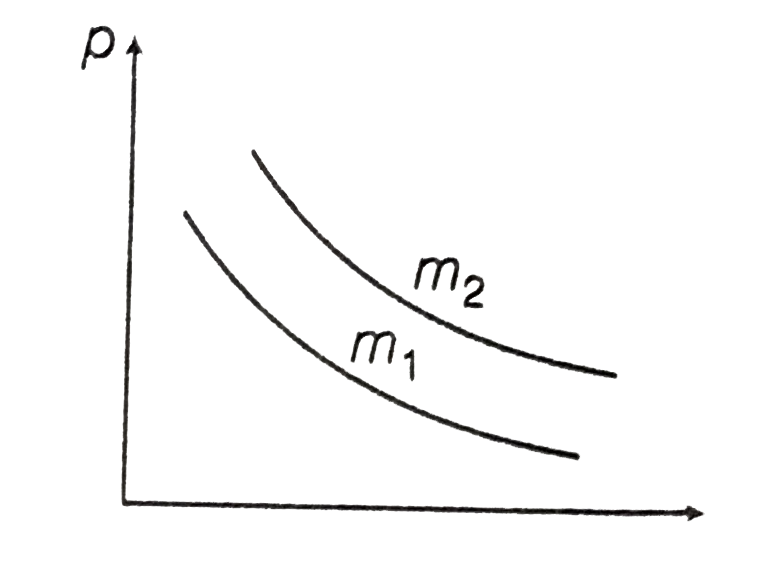Two identical containers A and B having same volume of an ideal gas at same temperature have mass of the gas as m1 and m2 respectively and 2m1=3m2. The gas in each cylinder expands isomthermally to double of its volume. If change in pressure in A is 300Pa, then the change in pressure in B is
200 Pa
300 Pa
400 Pa
500 Pa
The correct Answer is:A
To solve the problem, we will use the ideal gas law and the relationship between mass, pressure, and volume during isothermal expansion.
1. Understanding the Given Information:
- We have two identical containers A and B with ideal gases.
- Mass of gas in container A is m1 and in container B is m2.
- The relationship between the masses is given as 2m1=3m2.
2. Expressing Masses:
- From the relationship 2m1=3m2, we can express m2 in terms of m1:
m2=23m1
3. Using the Ideal Gas Law:
- The ideal gas law states that PV=nRT, where n is the number of moles.
- The number of moles n can be expressed as n=mM, where M is the molar mass of the gas.
- For container A:
P1V=m1MRT⟹P1=m1RTMV
- For container B:
P2V=m2MRT⟹P2=m2RTMV
4. Calculating the Initial Pressures:
- Substitute m2=23m1 into the equation for P2:
P2=(23m1)RTMV=2m1RT3MV
5. Calculating Change in Pressure for Container A:
- The gas in container A expands isothermally to double its volume:
P′1=m1RT2MV
- The change in pressure for container A is:
ΔPA=P1−P′1=m1RTMV−m1RT2MV=m1RTMV(1−12)=m1RT2MV
6. Given Change in Pressure for Container A:
- We know ΔPA=300Pa:
m1RT2MV=300
7. Calculating Change in Pressure for Container B:
- The gas in container B also expands isothermally to double its volume:
P′2=m2RT2MV
- The change in pressure for container B is:
ΔPB=P2−P′2=2m1RT3MV−m2RT2MV
- Substitute m2=23m1:
ΔPB=2m1RT3MV−(23m1)RT2MV=2m1RT3MV−m1RT3MV=m1RT3MV
8. Relating Changes in Pressure:
- From the previous steps, we have:
ΔPB=m1RT3MV
- We can relate ΔPB to ΔPA:
ΔPB=13ΔPA=13×300=100Pa
Final Answer:
The change in pressure in container B is 100Pa.
- We have two identical containers A and B with ideal gases.
- Mass of gas in container A is m1 and in container B is m2.
- The relationship between the masses is given as 2m1=3m2.
- From the relationship 2m1=3m2, we can express m2 in terms of m1:
m2=23m1
- The ideal gas law states that PV=nRT, where n is the number of moles.
- The number of moles n can be expressed as n=mM, where M is the molar mass of the gas.
- For container A:
P1V=m1MRT⟹P1=m1RTMV
- For container B:
P2V=m2MRT⟹P2=m2RTMV
- Substitute m2=23m1 into the equation for P2:
P2=(23m1)RTMV=2m1RT3MV
- The gas in container A expands isothermally to double its volume:
P′1=m1RT2MV
- The change in pressure for container A is:
ΔPA=P1−P′1=m1RTMV−m1RT2MV=m1RTMV(1−12)=m1RT2MV
- We know ΔPA=300Pa:
m1RT2MV=300
- The gas in container B also expands isothermally to double its volume:
P′2=m2RT2MV
- The change in pressure for container B is:
ΔPB=P2−P′2=2m1RT3MV−m2RT2MV
- Substitute m2=23m1:
ΔPB=2m1RT3MV−(23m1)RT2MV=2m1RT3MV−m1RT3MV=m1RT3MV
- From the previous steps, we have:
ΔPB=m1RT3MV
- We can relate ΔPB to ΔPA:
ΔPB=13ΔPA=13×300=100Pa
The change in pressure in container B is 100Pa.
Similar Questions
Two identical containers A and B having same volume of ideal gas at the same temperature have mass of the gas as mA and mB respectively. 2mA=3mB. The gas in each cylinder expand isothermally to double its volume. If the change in pressure in A is Δp, find the change in pressure in B:
View SolutionAn ideal gas at 300K is expanded isothermally to double its volume,then pressure of the gas will be
View Solution
Knowledge Check
Two identical containers A and B with frictionless pistons contain the same ideal gas at the same temperature and the same velocity V. The mass of the gas in A is mA, and that in B is mB. The gas in each cylinder is now allowed to expand isothermally to the same final volume 2V. The changes in the pressure in A and B are found to be ΔPand1.5ΔP respectively. Then
A1. 4mA=9mBB2. 2mA=3mBC3. 3mA=2mBD4. 9mA=4mBTwo identical containers A and B with frictionless pistons contain the same ideal gas at the same temperature and the same velocity V. The mass of the gas in A is mA, and that in B is mB. The gas in each cylinder is now allowed to expand isothermally to the same final volume 2V. The changes in the pressure in A and B are found to be ΔPand1.5ΔP respectively. Then
A4mA=9mBB3mA=3mBC3mA=2mBD9mA=4mBTwo identical containers A and B with frictionless pistons contain the same ideal gas at the same temperature and the same velocity V. The mass of the gas in A is mA, and that in B is mB. The gas in each cylinder is now allowed to expand isothermally to the same final volume 2V. The changes in the pressure in A and B are found to be ΔPand1.5ΔP respectively. Then
A4mA=9mBB3mA=3mBC3mA=2mBD9mA=4mB
If one mole of an ideal gas (Cp.m.=52R) is expanded isothermally at 300K until it’s volume is tripled, then change in entropy of gas is:
View SolutionTwo different isotherms representing the relationship between pressure p and volume V at a given temperature of the same ideal gas are shown for masses m1 and m2 then

View SolutionIf a gas absorbs 200J of heat and expands by 500cm3 against a constant pressure of 2×105Nm−2, then the change in internal energy is
View SolutionTwo monatomic ideal gas 1 and 2 of molecular masses m1andm2 respectively are enclosed in separate containers kept at same temperature. The ratio of the speed of sound in gas 1 to that in gas 2 is given by
View SolutionWhich of the following gases will have least volume if 10g of each gas is taken at same temperature and pressure?
View Solution
